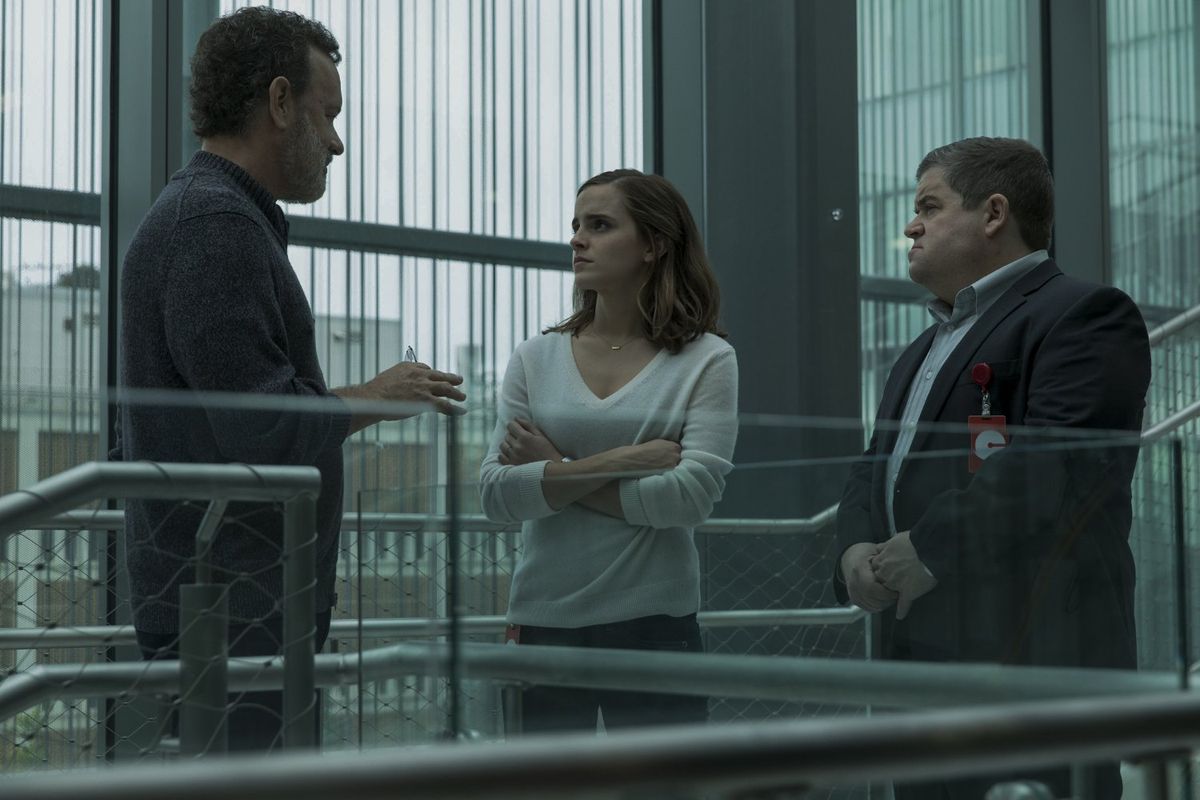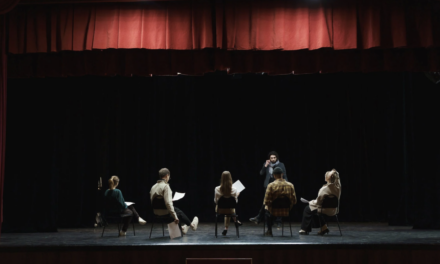In an age where there are number of growing concerns regarding the tech industry and its access into our lives, The Circle ignores the multiple plots that could feel close to reality in favor of the absurd with disastrous results. Here we have a collection of Hollywood’s best and brightest doing their whatever they can to give life to an adaptation of a short story I’m convinced author Dave Eggers himself would call a lesser work. There is no a single person involved in the production whose talent utilized is utilized to its full potential. The likelihood of such a misfire coming to pass is about the same as you or I winning the lottery tomorrow, yet – here we are.
Emma Watson stars as Mae, a modest young woman from a lower middle class family in a small town who lands a job at the world’s biggest tech company, The Circle. What exactly the circle does is a little vague, but suffice to say it’s an amalgamation of every big, real world silicon valley startup rolled into in one. Mae’s job is in customer service, but she soon discovers life at The Circle is a bit more than she initially thought. Many staff live on the company’s sprawling campus, and there are numerous activities happening at all hours of the day to encourage community building and lift morale. Everyone is connected all the time, which forces Mae to leave behind her simplistic life in order to make the most of her new opportunity.
Not long after Mae’s arrival she learns the company’s founder, Bailey (Tom Hanks), is about to change the world yet again. His new invention is essentially tiny, wireless camera that is virtually invisible to the naked eye and capable of streaming HD quality video 24/7 in perpetuity to The Circles’ users. These cameras also provide in-depth analytics for everything they capture, from the amount of carbon monoxide on a crowded freeway to the temperature of the water at a remote beach, at retail cost that Bailey claims would be less than a pair of pants. It’s a MacGuffin for the creation of Egger’s personal take Big Brother, and as soon as its revealed the rest of the film snaps into focus with little to no deviation from the predictable fallout.
Everyone loves the new tech, except for quiet employee named Ty (John Boyega), who entrusts Mae with his worries over the company’s painfully obvious plans to do away with privacy. Instead of heading his advice, or the advice of literally anyone else she interacts with other than Bailey, Mae volunteers to ‘go transparent’ and wear a modified version of the new tech on her body at all times. She willingly becomes a human billboard for surrendering your piracy in the pursuit of viral fame without a second thought despite the fact we’re told she a brilliant and clever women only to later realize the error of her ways a bit too late.
There have been stories of script problems surrounding The Circle for months, so it should come as no surprise that the evidence of too many hands being involved in the production process appear throughout the film. For example, Patton Oswalt appears as Bailey’s’s lawyer and right hand man. He’s on screen nearly every minute that Tom Hanks is, yet his character has maybe three lines of dialogue in the entire film. Worse yet, we’re never told of anything he does off screen, so his presence is always without meaning. He appears to be a henchman of some sort, a nefarious businessman who hides the fact he cares little for his fellow man, but you would never know it based on what happens in this film.
It is impossible to not mention Bill Paxton in this review, who lost his life earlier this year. The Circle serves as Paxton’s final big screen turn, and in it he plays Mae’s MS stricken father. His work is great, but there is unfortunately very little of it to be seen.
The problems with The Circle stretch well beyond abbreviated character arcs. Everything that happens in this film happens in a bubble that exists at The Circle itself. There is no sense of time or place, whether or not the government is concerned or paid off, how people outside The Circle network feel about the company. As use of the cameras rise, no one ever questions their use as it relates to personal privacy, even though we’re shown and told numerous people are suing the tech around the globe. No questions of ethics whatsoever are poised until they quite literally come crashing into focus nearly two-thirds through the runtime. This leaves about thirty-five minutes for a resolution, which pushes the execution of the climax completely off screen. I mean that in the most literal sense. Aside from a “gotcha” moment to end all gotcha moments, the planning and execution of the film’s most important turn happens off screen via a character we spend less than fifteen minutes with throughout the story.
James Ponsoldt has delivered to of the best films of the last decade (The Spectacular Now, The End of the Tour), but even his writer-director talents can not give this slog of would-be tech thriller the life it needs. I am convinced that he is not able to make this story work, especially with Hanks and Watson as his disposal, there is no one in Hollywood who could make a version of this that people love. There are too many real threats posed by technology today for us to get caught up on a movie as stupid as this, regardless of the people attached to it.













